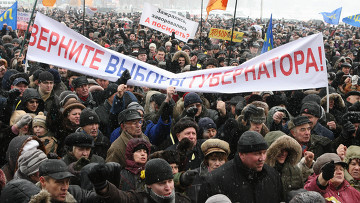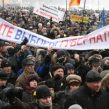
Russian Protests Grow as Economic Hardships Persist
Publication: Eurasia Daily Monitor Volume: 7 Issue: 24
By:

The economic downturn in Russia seems to have transmuted into growing political discontent within the populace and the governing structures. Since last summer, Prime Minister Vladimir Putin has been proclaiming publicly that “the worst of the recession is over and growth is resuming” (Interfax, June 9). The populace believed the vocal state-run propaganda, hoping that this economic crisis will be like the previous one in 1998 –a sharp decline in GDP, followed by a solid and quick recovery of the sustained growth in public prosperity as in 2000-2008– under Putin’s supreme leadership. However, the crisis turned out to be different –there is still no recovery in Russia– only stagnation coupled with inflation (stagflation). Deputy Minister of Economy and Development, Andrei Klepach, was again optimistic this week, announcing that “the recession is over,” since according to statistics there was a 1 percent GDP growth in the third and fourth quarters of 2009. GDP declined in 2009 by some 8 percent, inflation remains high, though Klepach hopes it will be under 8 percent in 2010, investment is alarmingly low, and there is no growth in salaries or in retail sales (Interfax, February 2). President Dmitry Medvedev announced that Russia must improve its investment climate, since the nation does not have resources to restart the economy without foreign capital (Interfax, February 3).
With no visible improvement, the continued state propaganda mantras about Putin’s anti-crisis measures saving Russia are counter-productive. The Russian public is becoming noticeably restless and tensions are growing within the ruling class. This week an ugly row has erupted within the Russian leadership. The speaker of the upper house of parliament (the Federation Council) Sergei Mironov in an interview on state TV announced that he does not support Putin’s budget proposals or his “anti-crisis measures” (Interfax, February 2). Mironov is Putin’s friend from St. Petersburg and is the head of a Kremlin-loyal “opposition party,” Just Russia, with a small faction in the State Duma.
Mironov’s mild disagreement with Putin over economics caused an uproar. The ruling United Russia party that has Putin as its chairman, declared Mironov to be “a rat” and a “liar that is stabbing Putin in the back.” United Russia announced it will seek Mironov’s resignation as speaker and oust him from parliament. The leadership of Just Russia replied that United Russia “must drink less vodka” (Interfax, February 3). Constitutionally, the Speaker of the Federation Council is the third most important post in the Russian State after the President and Prime Minister, but in Moscow Mironov never was an important player. Mironov and his Joint Russia do not really threaten Putin or United Russia, and most likely the hullaballoo over the TV interview will fizzle out, but it shows the state of agitation and genuine fear at the top.
Last Saturday, a large anti-government and anti-Putin rally was held in Kaliningrad –the capital of the Russian Baltic enclave. Some 12,000 protesters gathered in the center of Kaliningrad –the biggest anti-government rally in Russia since 2000. The rally united communists, pro-Western liberals, nationalists and ordinary citizens to protest against higher local taxes and utility payments, to demand the resignation of the local Kremlin-appointed governor Georgy Boos and Putin. There is high unemployment in Kaliningrad, while Putin made things worse by imposing restrictive protectionist anti-crisis tariffs on the imports of used cars into Russia from Western Europe. Putin’s tariffs were intended to help the broke LADA-producer AVTOVAZ, but at the same time it drove into poverty many in Kaliningrad who profited from the car trade. Putin’s anti-crisis measures are helping super-rich oligarchs and this is also proving to be unpopular (Vedomosti, Kommersant, February 1).
Large numbers of local police were deployed in Kaliningrad, but did not attack the protesters when the rally turned anti-Putin. In fact, some policemen seemed to sympathize (Ekho Moskvy, January 30). United Russia reacted to the Kaliningrad rally by announcing: “Only two forces today oppose Putin –the Americans and the citizens of Kaliningrad” (Kommersant, February 3).
The day after the Kaliningrad rally, the riot OMON police dispersed and arrested human rights activists in Moscow that had attempted to gather in support of freedom of speech and the right to public assembly. In Moscow, the authorities regularly suppress opposition activities and there were dozens of arrests (Interfax, January 31). The US State Department criticized the suppression of a peaceful demonstration in Moscow and Foreign Minister Sergei Lavrov replied by accusing the US of “double standards” (www.mid.ru, February 3).
Officers from the 2nd battalion of the Moscow OMON wrote an open letter to Medvedev, and told journalists of the liberal weekly, The New Times, that they are being regularly indoctrinated about the CIA “organizing opposition and gay-rights protests in Moscow, the Americans handing out money to destroy Russia through demonstrations.” The OMON officers complained that they are forced to serve long hours for low pay, as well as to protect mobsters and organized prostitution by corrupt superiors and file false reports to convict arrested human rights activists. Corrupt police commanders in Moscow, according to the OMON rank and file, are allowed to earn fortunes through racketeering in return for loyally beating up protesters and journalists. Anyone displaying anti-Putin or anti-Medvedev slogans must be immediately attacked (The New Times, February 1). The interior ministry replied that The New Times report was false, and the OMON officers that told the story were “criminals,” “rats” and “traitors” that were fired from the ranks. It was announced that a special meeting of the 2nd OMON battalion unanimously expressed support to its commanders, condemning the traitors and the journalists. The interior ministry promised to litigate The New Times (Interfax, February 3).
Medvedev announced last December his intention to cut by 20 percent and reform the notoriously corrupt and inefficient interior ministry police force (RIA Novosti, December 24). Apparently, the Kremlin did not expect that the announcement of a cosmetic reform may lead to destabilizing disclosures and growing discontent.




